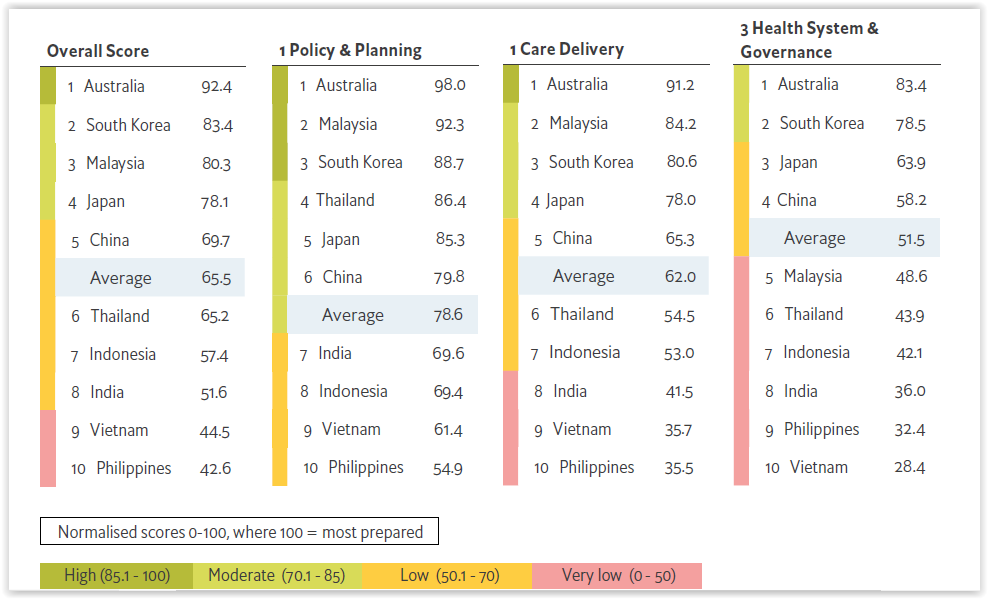KUALA LUMPUR, July 9 — Malaysia ranked third place in the Asia Pacific for cancer preparedness, behind Australia and South Korea, according to a study by the Economist Intelligence Unit (EIU).
According to the EIU report “Cancer preparedness in Asia-Pacific: Progress towards universal cancer control”, Malaysia scored 80.3 out of 100, higher than the regional average of 66.5. The score of 100 denotes the most prepared.
The study by the research and analysis division of Economist Group on cancer challenges involved 10 countries in the Asia Pacific region: Australia, China, India, Indonesia, Japan, Malaysia, Philippines, South Korea, Thailand and Vietnam.
Australia (92.4) and South Korea (83.4) topped the Index of Cancer Preparedness, while Thailand (65.2), Indonesia (57.4), India (51.6), Vietnam (44.5) and Philippines (42.6) scored below than the regional average of 66.5.
The countries were evaluated under three main domains: policy and planning, care delivery, and health system and governance, followed by 11 sub domains.
Malaysia demonstrated strong performance under the policy and planning as well as care delivery domains, scoring 92.3 and 84.2 respectively. However, Malaysia scored 48.6, below the average of 51.5, in the health system and governance domain.
Political will, infrastructure, as well as intersectional action and governance, were listed as the subdomains of the health system and governance domain.
This study also revealed that high-income countries performed better than upper and lower middle income countries, which clearly indicates that the income level of a country influences its performance in overall cancer preparedness.
At the same time, the health care spending of a country is also closely related to the “political will” indicator, according to the study.
Besides that, Australia, Malaysia and South Korea set best examples of cancer registries, compared to Indonesia, Philippines and Vietnam that required more improvement in data collection of cancer patients.
The report also emphasised that cancer incidence in the region is expected to increase by around 35 percentage points, with mortality rising by nearly 40 percentage points by 2030.
Approximately 50 per cent of total global cancer incidence occurs in the Asia-Pacific region, which EIU said called for strong cancer plans and policy formation.
Malaysia’s National Strategic Plan for Cancer Control Programme (NSPCCP) was deemed as a high-quality plan in the Asean region. However, lack of clarity in financial resources dragged the performance of the plan, said the EIU report.
A total of 70 per cent of cancer cases in low- and middle-income countries in Asia were diagnosed at a late stage, as per the report. This stipulates more preventive services focusing on population-based screening.
Although Indonesia and Malaysia denoted an increase in health spending, while China has the biggest reduction in out-of-pocket health expenditure, the report shows only high-income countries meet the recommended spending for universal health coverage by the World Health Organization (WHO).
“We are encouraged that countries across the region are increasing their focus on cancer preparedness from a policy perspective and making positive progress,’ said Rachel Frizberg, Area Head Asia Pacific at Roche Pharma, a Swiss multinational health care company.
“However, we need to collectively strengthen our efforts to implement these policies and achieve better outcomes for patients. This is even more apparent in light of the current Covid-19 pandemic, which has impacted all areas of cancer care,” she added.
Australia was mentioned as the best country in implementing tobacco control measures among the 10 countries, while Indonesia emerged as one of the countries which has the highest smoking rates in the world. The prevalence of smoking in Indonesia is at nearly 40 per cent among those aged 15 and older.
Malaysia is recorded as one of the top countries in the region in obesity and a lack of physical activities, which indicates the need to enhance healthy lifestyle policies to be translated into action.
Jesse Quigley Jones, the editor of the EIU report, highlighted the significance of laying foundations for a cancer response, focusing on implementation and results measurement, boosting prevention and early diagnosis, closing gaps in cancer care, constantly upgrading the efficiency of the system, and prioritisation to address cancer preparedness in each country.
“While upper-middle- and lower-middle income countries are pulling together more comprehensive cancer control plans, our index showed weaker performance in health system governance and service delivery domains, suggesting progress in addressing health infrastructure and service capacity is more limited,” said Jones in a virtual media briefing on the launch of the “Index of Cancer Preparedness – Asia Pacific”.
“A renewed political commitment is needed to address the cancer burden,” he added.
He also told a media briefing yesterday that improving tobacco control as well as healthy lifestyle policies is one of the key measures to boost cancer prevention and early cancer diagnosis.
Jones pointed out the necessity of strengthening primary care networks, addressing sustainable financing of policies, increasing public health care spending, and widening the cancer treatments covered by national insurance schemes to close the gaps in the cancer care of a country.
The report conveyed that excess cancer mortality and late diagnosis are the major challenges for lower- and middle-income countries in the region.
National Cancer Society Malaysia president Dr Saunthari Somasundara highlighted the delay in cancer treatment in Malaysia due to the Covid-19 pandemic.
“Now when things are relaxed, patients are going back to treatment schedules, but there is a backlog and there is a delay. You are looking at three to six months’ delay in terms of treatment,” she said.
She mentioned that the major hospitals which served Covid-19 patients were also providing the majority of cancer treatments in Malaysia.








